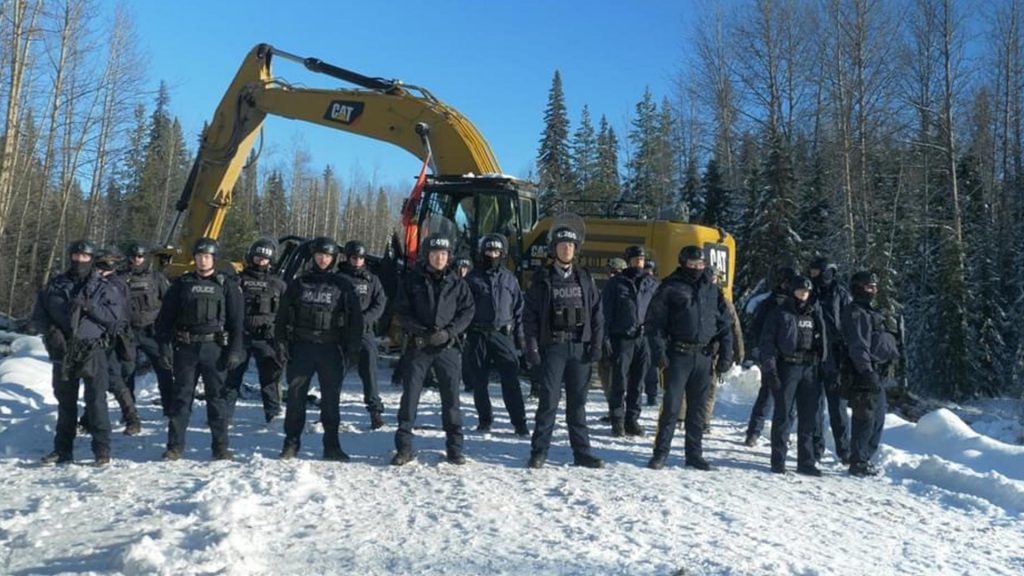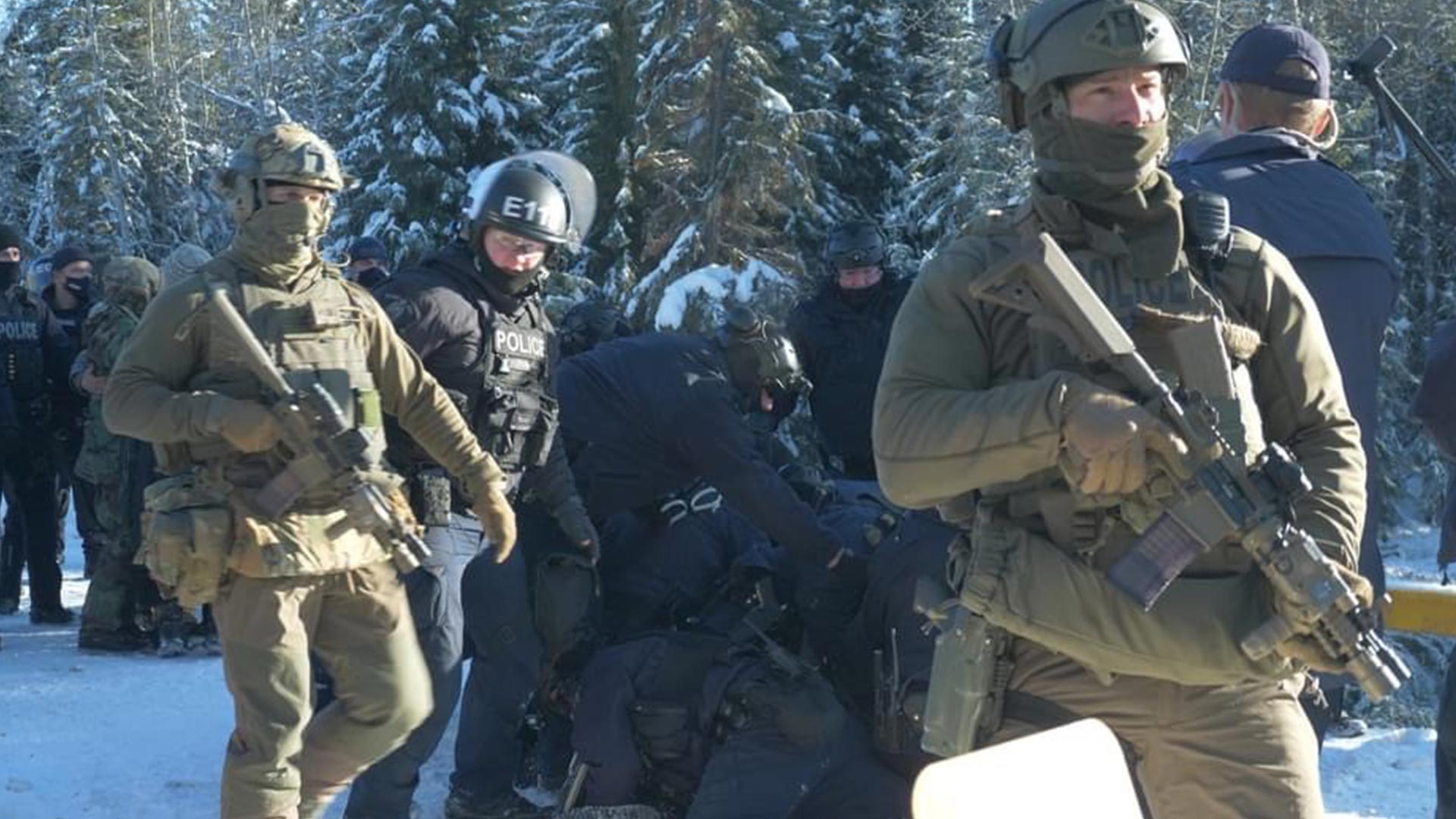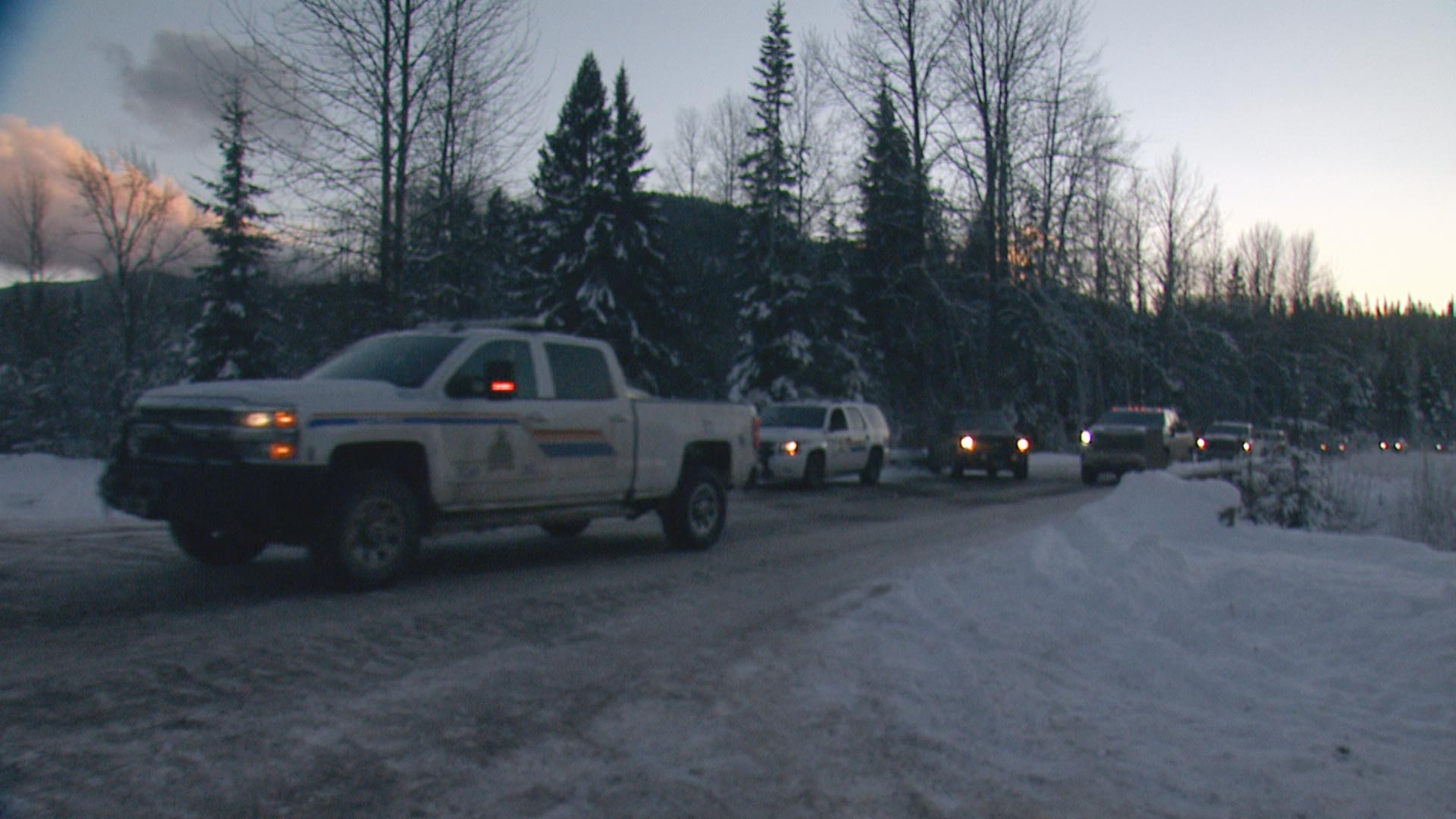
An RCMP tactical group, (C-IRG) converged on Wet'suwet'en-led resistance camps for the third straight year on Nov. 18, 2021. The operation continued on Nov. 19. Photo: Dan Loan/Twitter
Wet’suwet’en Hereditary Chief Na’Moks says it’s “unsettling” to see how easily the B.C. RCMP’s secretive Community-Industry Response Group (C-IRG) obtains cash and cops from the provincial government, even in the midst of last year’s historic floods.
It reveals an “industry driven” approach to policing, said Na’Moks, also known as John Ridsdale, in a phone interview. “Clearly it shows who’s directing it, which is industry along with the elected officials.”
He was reacting to newly released documents that show a senior Mountie with the C-IRG pressed public safety officials to hastily greenlight a tactical operation on Wet’suwet’en territory after cataclysmic extreme weather started devastating parts of the province.
“That man-power could’ve been used in the flooding that happened in the lower mainland. That man-power should’ve been used there,” said Na’Moks. “Instead they put taxpayer money out here to protect the pipeline that, to us, is illegal. We’ve evicted them. We’ve never agreed to it.”

B.C. residents awoke on Nov. 15, 2021 to find portions of their province under water. Tidal waves of mud had washed out highways overnight. Residents scrambled to evacuate surging floodwater and pounding torrential rain.
On that same morning, at 9:42 a.m. Chief Supt. John Brewer, gold commander of the C-IRG, an outfit established in 2017 to police protests against resource extraction, emailed the ministry with an urgent request for more Mounties.
“As you know we are going to marshal resources to open the Morice [Forest Service Road] as soon as practicable,” Brewer wrote, referring to a remote logging road roughly 60 kms west of Houston where Coastal GasLink pipeline workers were caught in blockades.
“Given the known numbers and posture of the contemnors causing the blockade, I will need resources in the Tactical Support Group (TAC, ERT) to accomplish this,” Brewer continued, referring to activists allegedly violating a civil injunction, as well as the blue- and green-clad police groups that enforce it.
Brewer said these units have members from federal, provincial and municipal “business lines,” so he needed verbal or electronic authorization to redeploy them under Article 9.1 of the Provincial Police Service Agreement.

The deal, a 20-year contract with Ottawa, allows B.C. to internally redeploy the RCMP to deal with emergency situations if, “in the opinion of the Provincial Minister,” one is deemed to exist.
Brewer told the ministry he had a seven-day window for operations and then a period of time “to assess and hold” the road before handing it over to the C-IRG’s post-enforcement quick response team.
“I will follow up in writing as per normal, but time is of the essence right now,” reads the email, which was obtained by APTN under B.C.’s freedom of information law. “I have engaged [the divisional liaison team] today to seek a peaceful resolution to open the road, but with a tight time line of 3 days comfort/life support for the workers behind the blockades, I need to move resources now.”
The email, as first reported by The Tyee, which also obtained it, contradicts what Brewer previously told APTN about the operation.
“It certainly wasn’t planned during floods,” Brewer said in December 2021, insisting the RCMP met its commitment to the flood response no matter what. “The operation was being planned to open up that road before the floods hit.”
Initially, when first contacted by APTN, the Public Safety Ministry refused to say when the operation was approved. After repeated requests, a spokesperson confirmed Public Safety Minister Mike Farnworth sanctioned the redeployment on Nov. 15.
But it’s now clear this was the informal verbal approval referenced in Brewer’s email, according to an unsigned copy of Farnworth’s written authorization dated Nov. 18, the day the two-day raid began.
“I am writing to you following recent discussions between yourself and Ministry staff regarding the potential police response required to address an intensified opposition to Coastal GasLink pipeline construction,” said the letter, which is addressed to B.C. RCMP Commander Dwayne McDonald. “This opposition has evolved to an urgent and critical nature.”
The correspondence said Farnworth was authorizing temporary internal redeployment “to the extent necessary to maintain law and order, and to ensure the safety of persons, property and communities in the area.”
Read more:
B.C. greenlit more Mounties on Wet’suwet’en territory before 3rd raid
After reviewing the exchange, Na’Moks said it reveals an automatic, uncritical government approval process for the C-IRG and its operations.
“They get a rubber stamp,” said Na’Moks. “They are supporting industry, and that’s with the help of the provincial and federal government. They know exactly what they’re doing.”
Farnworth’s letter added the caveat that all provincial resources should be exhausted before pulling from municipalities. It concluded by saying Farnworth would appreciate an appraisal “if the situation escalates” and requires cops from federal or out-of-province police groups.
“Please continue to notify the ministry of the planned actions and further developments,” it said. “Further requests may be authorized upon consultation with Assistant Deputy Minister, Wayne Rideout.”
Rideout, director of police services, had a 34-year career as a Mountie before becoming a senior provincial public safety official in 2016, as reported this month by The Georgia Straight.
In 2013, Rideout was the senior officer overseeing an undercover counter-terrorism sting that was reminiscent of the dirty tricks used in the 1970s by the now-disbanded RCMP Security Service.
Mounties under Rideout’s command, acting on a CSIS tip, tricked two fledgling extremists into planting three pressure-cooker bombs filled with fake explosives near the B.C. legislature.
The RCMP then charged the duo and obtained convictions, but in 2016 a judge stayed the proceedings on grounds that state misconduct had undermined the integrity of the justice system.
Justice Catherine Bruce said Mounties engaged “in a multi-faceted and systematic manipulation” of the pair to induce them into executing the bogus bomb plot.
“The spectre of the defendants serving a life sentence for a crime that the police manufactured by exploiting their vulnerabilities, by instilling fear that they would be killed if they backed out, and by quashing all doubts they had in the religious justifications for the crime, is offensive to our concept of fundamental justice,” Bruce wrote. “Simply put, the world has enough terrorists.
“We do not need the police to create more out of marginalized people who have neither the capacity nor sufficient motivation to do it themselves.”

Reacted Na’Moks: “I don’t know why they can get away with such an illegal tactic and then have the courts and government say, ‘It’s OK, a slap on the wrist. We’re going to promote you later.’ How on earth does that work in a so-called democratic country?”
Coastal GasLink has signed benefit agreements with 20 bands along the provincially permitted route, including five of six Wet’suwet’en communities. It obtained an inunction in 2018.
But the company has failed to secure consent from the hereditary chiefs who stalwartly maintain the pipeline passes through areas under their jurisdiction. Wet’suwet’en and supporters have built camps to assert Aboriginal title and resist construction.
Last month, RCMP announced an investigation into a confrontation that happened Feb. 17 shortly after midnight between masked assailants and pipeline workers.
Police called it a “very troubling escalation in violent criminal activity” that left workers shaken and caused millions of dollars in damage.
Mounties subsequently released footage of the attack but haven’t announced any arrests.
Na’Moks said he was aware police were probing two persons of interest.
Read the documents:










